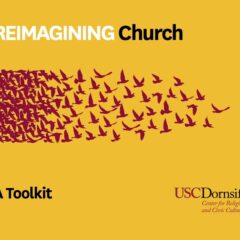In our 2017 religion trends to watch, one of our snarky headlines read: “New Species of Evangelicals Discovered.” As we pointed out under the headline, the divisions in Evangelicalism have long existed. We also predicted, quite correctly, that journalists and pundits would finally realize that not all “evangelicals” are the same.
Indeed, in the aftermath of the 81 percent of white evangelicals who voted for Donald Trump, many articles have been written about the future of evangelicalism, both from inside and outside of the evangelical world. The two basic arguments are as follows: Evangelical insiders, such as Russell Moore of the Southern Baptist Ethics and Liberty Commission and Tim Keller, basically argue that all those white evangelicals who voted for Trump aren’t really evangelicals at all, but instead hold to some bastardized form of American cultural Christianity that masquerades as “evangelical” Christian. Journalists and scholars have tended to take the view that evangelical support for Donald Trump will result in a split, with some—mostly older and white—remaining within the evangelical world, and still identify as “evangelical Christian,” while others (mostly younger and ethnically diverse) will leave the evangelical world, or at least refuse the “evangelical” label identity.
Whatever the accuracy of either of these arguments, what all of these reports have wrong is that this is a new development within evangelicalism. Evangelical support of Donald Trump, and resistance to it from within evangelical circles should be understood as the most recent—and obvious—expression of longer standing differences within the evangelical world. The changes that are taking place within evangelicalism have been forming for several years, and CRCC scholars have been tracking these changes for several years.
Among the many pieces we’ve written about evangelicalism and its future, most relevant to the current spate of articles is Andrew Johnson’s post, written in June of 2016, who pointed out that owing to the race, ethnic and cultural differences within the broad umbrella of evangelicalism, it is difficult to capture everyone who may agree on basic theology, while differing on social, cultural and moral issues. Over all, what we’ve argued is that significant change is afoot for evangelicals and evangelicalism, but how that will actually play out remains to be seen. As Richard Flory wrote in 2014, in response to yet another series of articles on the decline of evangelicalism:
Is this the end of evangelicalism? I think the answer to that question depends on what you mean by “evangelicalism.” If the term refers to the form of conservative American Protestant Christianity dominated by white men in large churches that has had a significant sociopolitical impact—particularly in the Republican Party—over the past 30 years, then probably yes. But, if “evangelical” includes smaller, more socially inclusive, more ethnically diverse groups that own little or no real estate, that have less interest in traditional political commitments, that tend to put their faith into action through social justice ministries and that simply desire to be a “Christian presence” in the larger culture, then probably no.
Click here to read CRCC’s 2017 Trends to Watch
Click here to read CRCC’s 2018 Trends to Watch





